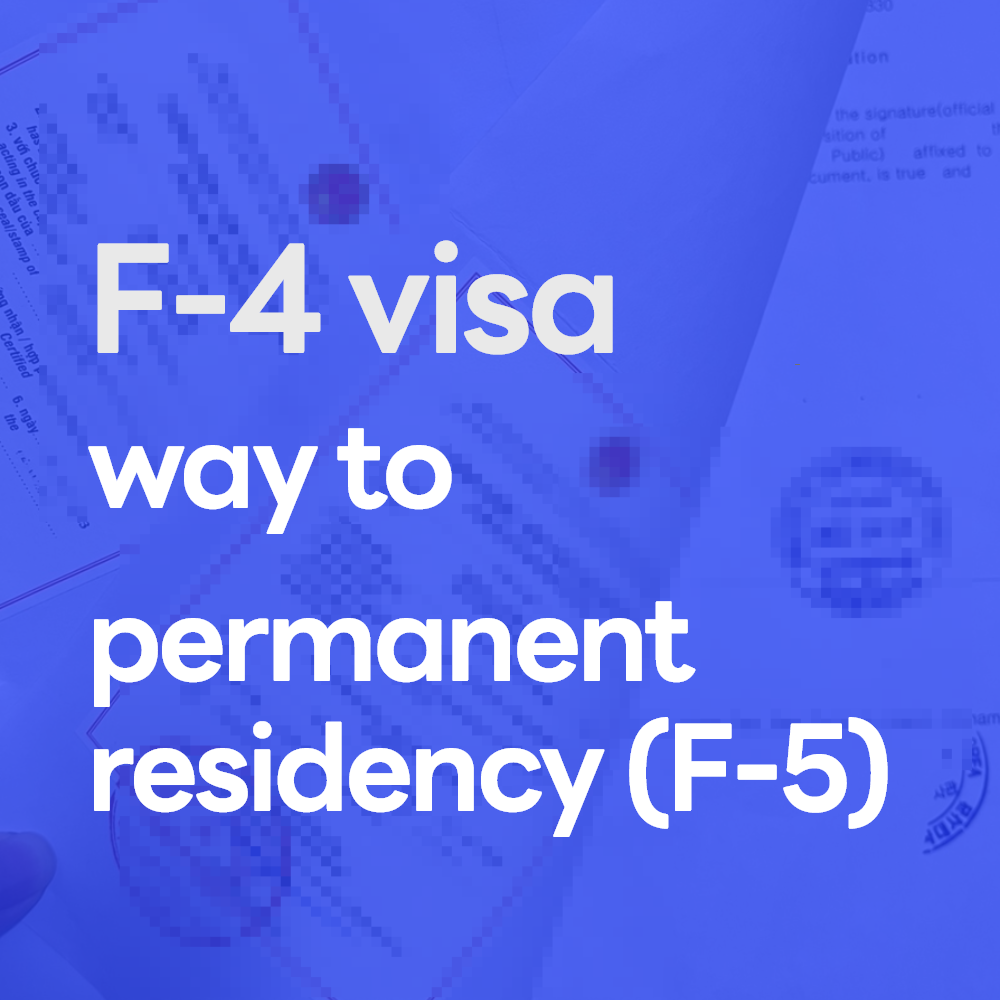
Hello. This is K-Visa, Korea’s no. 1 foreign visa service.
Today, we will look at how to change the overseas Korean (F-4) visa to permanent residency (F-5) visa in Korea.
Permanent residency is one of the most difficult visas for foreigners to obtain in Korea. There are a total of 18 conditions under which you can change to permanent residency, but for general foreigners, the income standard is applied at twice the GNI (Gross National Income) per capita of the previous year, and only those with an annual income of about 85 million KRW or more can change to permanent residency. However, for overseas Koreans, the criteria are somewhat relaxed, and you can apply for permanent residency as long as you have an income equivalent to the GNI. Due to these more favorable conditions, many overseas Koreans hope to make this change. So, let’s take a closer look.
Requirements for changing to Permanent Residency (F-5) for Overseas Koreans
- Overseas Koreans who have stayed in Korea for more than 5 years with a D-7 to F-2 visa status
- Overseas Koreans who have stayed in Korea for more than 2 years with an F-4 visa status
- Overseas Koreans with an annual income equivalent to or higher than the previous year’s GNI per capita (for 2023, the 2022 GNI is applied, approximately 42.2 million KRW)
- Overseas Koreans aged 60 or older receiving a pension equivalent to or higher than the GNI per capita from abroad
- Overseas Koreans who paid more than 500,000 KRW in property taxes in the previous year and have assets equivalent to or higher than the average net assets per household in Korea (approximately 420 million KRW)
- Individuals with trade performance of more than 2 billion KRW annually with Korean companies
- Overseas Koreans who have maintained an investment for more than 5 years and have invested an amount announced by the Minister of Justice

F-5 Permanent Residency Visa Livelihood Maintenance Requirements
Overseas Koreans who wish to change to permanent residency must prove that they can maintain their livelihood in Korea. They must have income or assets above a certain amount and meet at least one of the following conditions:
- Annual Income: Individuals with an annual income equivalent to or higher than the previous year’s national income (GNI) per capita
- Assets: Individuals with assets equivalent to or higher than the average net assets per household in Korea
- Investors in Korean companies with a trade amount of more than 500,000 USD
- Other Conditions: Individuals who meet other conditions announced by the Minister of Justice.
Required Documents for Permanent Residency Application for Overseas Koreans
통합 신청서
Consolidated application form
거소증
Residence card
해외 범죄 경력 증명서
Overseas criminal record certificate
소득 증빙 자료 (소득 금액증명원 등)
Income verification documents (such as income certificate)
신원보증서
Guarantee letter
체류지 입증서류
Proof of residence
영주자격 신청자 기본정보 (신청자 직접 작성)
Basic information of the permanent residency applicant (to be filled out by the applicant)
기타 ( 재직증명서, 가족관계증명서 등)
Others (employment certificate, family relationship certificate, etc.)
사업자의 경우: 사업자등록증, 소득 금액증명원 등
For business owners: business registration certificate, income certificate, etc.
F5영주자격 구비 서류
Required documents for F-5 Permanent Residency Qualification
Important Notes on Required Documents
If the overseas criminal record certificate is issued in a foreign language, it must be translated into Korean and the apostille or translation notarization process must be completed to recognize the document’s validity.
For overseas Koreans from the United States, document authentication can be done via apostille.
For overseas Koreans from China, as China is not a member of the Apostille Convention, it can proceed with translation notarization.
Example of Apostille and Translation Notarization for Overseas Documents
Important Notes on Changing to Permanent Residency for Overseas Koreans
Many overseas Koreans seek to prove their livelihood maintenance through their assets. There are many overseas Koreans who can maintain their livelihood in Korea without employment. The range of recognized assets includes real estate (applying market value), savings, deposits, stocks, securities, bonds, etc.
When calculating assets, only the amount excluding debts is recognized as it is based on ‘net assets’. Please be mindful of this aspect.

Typically, the review period is about 3~6 months after submitting the required documents without any issues. During the busy periods of foreign visa administrative work in February and September, there may be delays. Before applying, please ensure that your passport has sufficient validity remaining. The processing time can vary slightly depending on the jurisdiction of the immigration office. In some cases, it can take up to a year. If additional documents are needed during the review process, you will be notified by text message or phone call. At that time, prepare the supplementary documents quickly and send them by FAX to the responsible officer.
Services Provided by K-Visa
K-Visa offers comprehensive services for changing to permanent residency for overseas Koreans. When proceeding with our service, it will proceed based on the procedures below. All procedures are directly handled by certified administrative officers, and in case of any issues, we provide immediate guidance for quick resolution.
It is recommended to change to an F-5 permanent residency visa if you meet the qualifications, rather than continuously extending your F-4 visa.
- Free phone consultation
- Verification of applicant qualifications
- Listing of required documents matching the qualifications
- Guidance on personal documents to be prepared by the applicant, document handling by K-Visa
- Collection and final verification of required documents
- Submission by visiting the immigration office or submission on your behalf
- Guidance on preparing and submitting supplementary documents if required
- Completion of permanent residency issuance
- Receiving the permanent residency card by visit or mail

